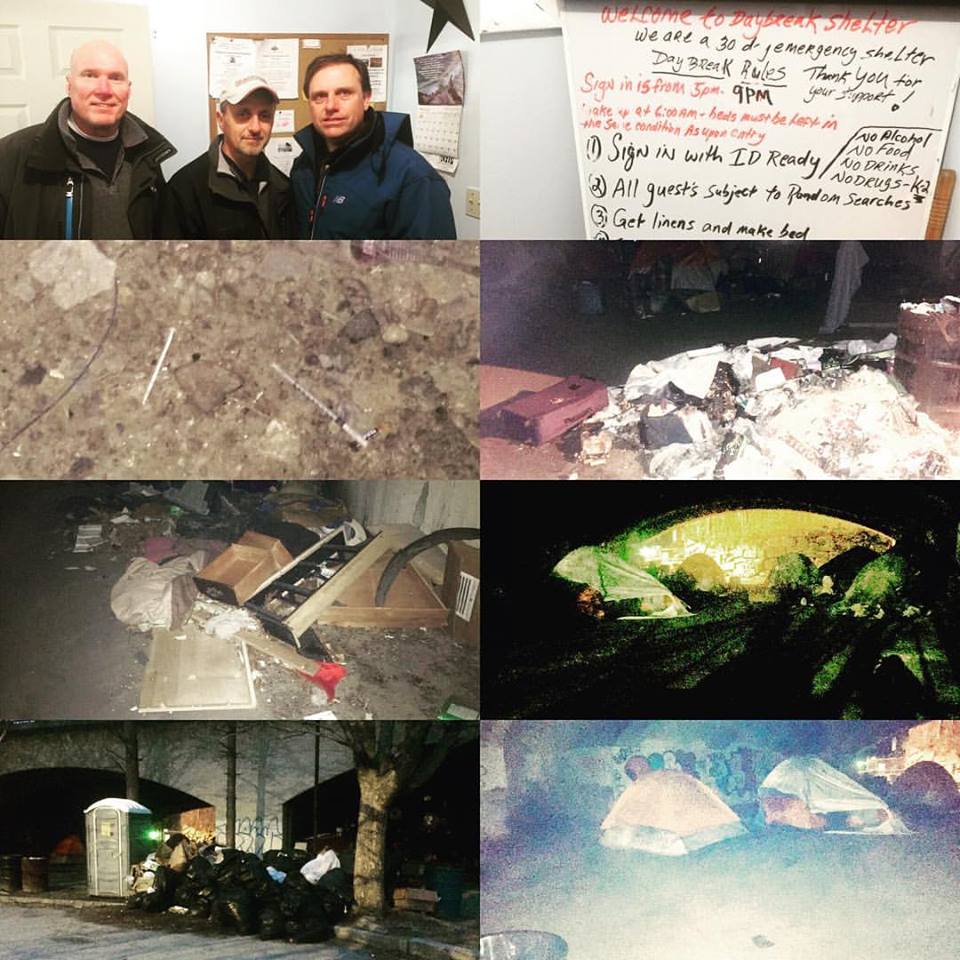By: Joe D’Amore-4-12-16
 When the sun goes down and the amber street lights flicker on, the arches under the bridge where a large population of homeless people live take on a surreal, nocturnal ambiance. The muted voices of people huddled in tents and makeshift lean-tos contrast the ceaseless din of cars overhead. In the distance there are wailing police sirens, in the foreground shouts and occasional laughter. Candles emit a labored, opaque light through the thin walls of the tents, casting ghostly shadows on the cold wet walls of concrete.
When the sun goes down and the amber street lights flicker on, the arches under the bridge where a large population of homeless people live take on a surreal, nocturnal ambiance. The muted voices of people huddled in tents and makeshift lean-tos contrast the ceaseless din of cars overhead. In the distance there are wailing police sirens, in the foreground shouts and occasional laughter. Candles emit a labored, opaque light through the thin walls of the tents, casting ghostly shadows on the cold wet walls of concrete.
This is home for many whose lives have been broken, a makeshift Mecca to which many pilgrimage for salvation. And it is the scene of urban survival in its most naked form.
So what should Lawrence do with its homeless population? Some are marginalized by addiction or mental illness, some are released prisoners facing social rejection and some are victims of large-scale economic problems. A few have options. But for many, those options are difficult to attain. Churches and social service organizations are unable to maintain the demand for services. That funding is scant can be seen at Daybreak Shelter on Winter Street. The state offers $25.00 per night to house an otherwise unsheltered person who would otherwise be sleeping on the street. The miracle workers at the shelter deliver services valued at four times that amount at least. The gap is filled largely by the compassion of volunteers and generous donors of clothing, food and other resources.
Anyone at Daybreak or huddled in a tent will offer their story on a dime. Those who directly interact with those in need in the streets will attest to the power of such remarkable spontaneous testimonies. Especially noteworthy are the stories’ similarities. Tragedy, poor decisions, unexpected circumstances “and boom—just like that, I am living under a bridge… It can happen to anyone. Believe me.”
The primary cause of homelessness in Lawrence is economic poverty. A number of factors beyond individual control, including stunted business development and job creation, combine to overwhelm struggling families. The city is one of the poorest in the state and has virtually no middle class. Of particular risk, including those structurally disadvantaged people mentioned above, are divorced or separated individuals and single women, who lose the competition for resources to those who maintains child custody.
To some degree, refocusing efforts to expand emergency shelters such as Daybreak will help address these issues. There is potentially a million square feet of abandoned, undeveloped or underdeveloped mill space in Lawrence. With only a fraction ; approximately 100,000 square feet of space, Daybreak could accommodate 200 people instead of its current 50 or so. The city could then seal the arches under the bridge and be certain that all marginalized persons would at least have an opportunity to garner the status of ; “sheltered-homeless.”
This option must be seriously considered. The voice of the homeless must be heard loudly and clearly as the city plans to developing the Manchester Rail Corridor, where Daybreak Shelter is currently situated. But we can also go a step further than expanding shelters. Specifically, low income subsidized housing units can be expanded. Such an expansion can be achieved using seed money committed by developers to offset developing market value and commercial buildings. Once these spaces are available, first- and last-month rents can be publicly and privately produced for those with minimum income sources so that they can be eased into housing.
Public policy can work to eradicate homelessness. Doing so is not only a humanitarian necessity, but an effective way of addressing the public health risks and social malaise which homelessness produces and which are highly visible in communities like the bridge. If otherwise unattended, the polarization of the city’s population will accelerate, and the ” have-nots” will approach the number of ” haves.”
Joe D’Amore writes from Groveland
